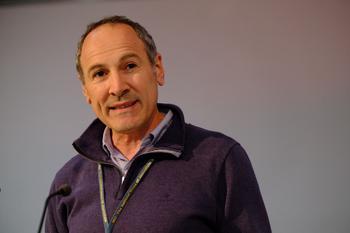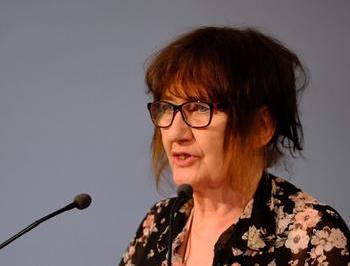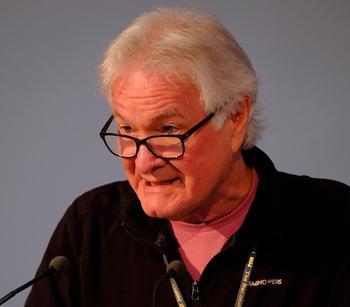DM2023: safety of journalists
The safety of journalists has been and will continue to be a major priority for the union
The union’s efforts to combat the abuse of journalists and protect their safety has been a major priority for the NUJ for the past two years, and a composite motion applauded the union’s work through the National Committee for the Safety of Journalists including the launch of a mobile safety toolkit, and a hard-hitting series of videos highlighting the ways media workers faced abuse, from death threats to constant online trolling.
The videos use the powerful testimony of members to tell the story of the threats, physical intimidation and online abuse – often racist and sexist – they experienced while doing their job. It has also been seen by UK MPs and peers and at international journalists’ events to raise awareness of the issue. The mobile app (and website version) gives safety advice for journalists: to protect themselves when covering protests; setting out journalists’ rights; securing their communications; reporting online abuse; and on wellbeing and mental health. It gives health & safety advice and practical guidance to reps so they can negotiate workplace policies to improve the safety of members. Storysmart, a suite of training modules on the website, provides advice on working in hostile and hazardous conditions.
The motion commits the union to continue with this work to promote the safety of journalists and to explore the establishment of a press freedom tracker using the example of the press freedom trackers in the US and Canada to create a database that monitors and reports on violations in real time (including arrests of journalist, seizure of equipment, assaults and police interrogation), allowing for comprehensive data on trends and incidence rates to be created and used to underpin campaigning work of this vital issue”.

Speaking for the Broadcasting Industrial Council, William Glennon said physical and verbal attacks were increasing against broadcast journalists and while he had experienced verbal abuse, one of his camera operators had been pushed to the ground when covering a court case. Adam Bowen, speaking for the NEC, said people were attempting to intimidate and silence journalists. A journalist was targeted and chased by anti-vaxxer protests who spied his BBC lanyard – three people were prosecuted, but too often the police are too slow to respond.
Darach MacDonald applauded the union for its speedy response in supporting and reporting abuse of journalists – often it is women in Northern Ireland who are subject to toxic, misogynist abuse and threats. “These threats can too often become reality,” he said. Seamus Dooley, assistant general secretary, in turn praised the branch for taking these attacks seriously and offering support to members. The union was working with the Police Service in Northern Ireland he said.
A late notice motion from Magazine and Books Industrial Council proposed by Pamela Morton, NUJ senior organiser, was concerned with the arrest of Ernest M a foreign rights manager for the French publisher Editions La Fabrique by British police when he arrived in London for the London Books Fair.
Pamela said: “He was arrested under terrorism legislation and interrogated in custody about his participation in the demonstrations in France, his views on pension reform, his view of President Macron and was asked to name anti-government authors at his publisher. His laptop and phone were confiscated and he will have to return to London on May 16. He is a journalist not a terrorist.” The Parliamentary Group has already taken up his case and the union will continue to work so that all proceedings against him are dropped and that his equipment is returned.
Anna Hervé, NEC books member, said: “This happened in London Olympia not Beijing. The London Book Fair is one of two of the most important meetings in the book world, so what will it say to others in the industry about this country?”
During one of the DM Week Talk-ins, Michelle Stanistreet said that journalists were beginning to see this abuse as part of the job, but it must not be tolerated and stamped out. She said there was evidence that journalists were removing themselves from social media platforms and avoiding writing about certain subject in order to avoid being targeted. Jeremy Dear, who chaired the event, said these union-led initiatives led by the NUJ were putting a spotlight on the level of abuse and setting out ways to protect journalists and photographers.
The motion also applauded initiatives such as the Press Safety or Pers Veilig project in the Netherlands, run partly through the NUJ’s sister union the NVJ. Journalists there have been suplied with flak jackets and film to stop bricks coming through the windows of their homes. It is hoped the proposed EU Media Freedom Act will protect media pluralism and increase safety for journalists. The union will now continue to work with the IFJ, media owners and other stakeholders on this issue.
The union’s Health and Safety Council noted that the Hazards Campaign highlights that suicides are one of the biggest single contributors to the annual work-related fatalities toll. However, they are absent from the Health and Safety Executive's statistics and from its inspection and prevention regimes, meaning that work-related suicides are not officially monitored or recorded. Conference agreed the union would support the campaign to have these deaths reported and included in the data.

Liz Else, speaking for the Health and Safety Council, said 10 per cent of suicides are said to be work related. There was, she said, a need for statistics and research to look at the effect of the heavy workloads and stress in the media and workplace. “That’s why we are asking the union to support the Hazards Campaign.”
The conference agreed to continue to campaign for an international inquiry into the murder of Martin O'Hagan. The Derry West motion expressed great concern that the murder “resulted from collusion between elements of the security forces and the Loyalist Volunteer Force to silence Martin's journalism”. The Sunday World journalist was shot dead in Lurgan in September 2001. On the 20th anniversary of his death, Michelle Stanistreet said the failure to secure a conviction of his killers was a stain on the history of policing in Northern Ireland.

Speaking to the motion were Amanda Ferguson, Belfast & district branch and a recipient of the Martin O’Hagan bursary, and Darach MacDonald, Derry West branch (pictured), who said a recent programme by BBC Spotlight revealed that informants had told the police that Martin was a target and who was planning to do it. “That is why we are asking the union to step up its campaign to get justice for Martin,” he said.
